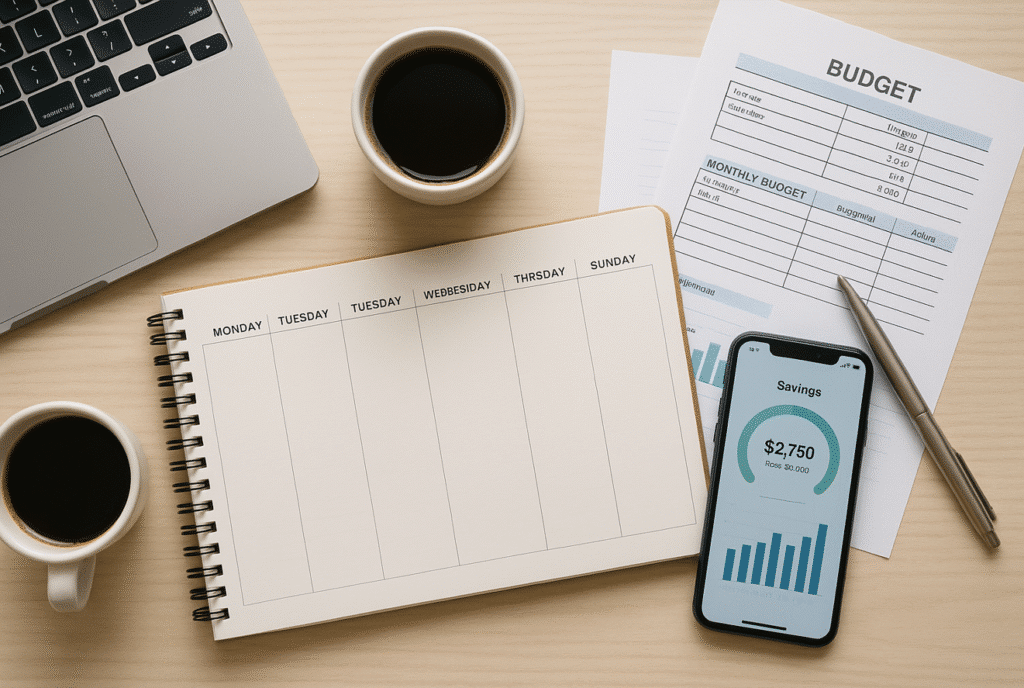How to Build a Personal Finance System in 7 Days (That Actually Works)
By Naveen Sharma | August 03, 2025
Managing money isn’t about remembering to cut back on coffee or downloading yet another budget app. It’s about having a repeatable system—one that quietly works in the background while you live your life.
A personal finance system is like an operating system for your money. It tells your income where to go, ensures your savings stay on track, and keeps you from making financial decisions in panic mode.
And here’s the good news: you can build one in just 7 days.
Not the kind of system that’s full of rules you won’t follow. But a real, smart, actionable framework that fits your life.
Ad Placeholder #1

Why a Personal Finance System Is Better Than “Trying to Save More"
Let’s face it: relying on willpower to manage money is a losing game. You’re busy, distracted, and life doesn’t slow down to let you manually juggle goals, bills, and savings.
A system removes friction. It turns good intentions into automatic results. And once set up, it works with minimal effort.
________________________________________
________________________________________
Before changing anything, you need visibility.
What you do:
• List all income sources
• List all monthly obligations: rent, utilities, EMIs, subscriptions
• List irregular costs: annual fees, travel, gifts, insurance premiums
• List assets and liabilities: mutual funds, PPF, loans, credit card balances
Why this matters:
You can’t optimize what you can’t see. A personal finance system starts with clarity.
________________________________________
Skip the vague “I want to save more” mindset.
What you do:
• Choose 1 short-term (1–2 years), 1 mid-term (3–5 years), and 1 long-term (10+ years) goal
• Write down why each one matters
• Break them into monthly targets (e.g., “I need to save ₹3,000/month for my Thailand trip”)
Why this matters:
Goals give your system a destination. Otherwise, you’re just accumulating money without direction—which often leads to waste.
________________________________________
Don’t build a budget around what you “shouldn’t” spend. Build it around what you want to achieve.
What you do:
• Set fixed categories: needs, wants, goals
• Use Goal-Based Budgeting: allocate specific amounts toward each goal before lifestyle upgrades
• Create a “Fun Fund” so your budget feels like freedom, not punishment
Why this matters:
Budgeting isn’t just about restriction. It’s about designing your life intentionally.
________________________________________
This is where your system becomes systematic.
What you do:
• Set auto-transfers:
o Salary account → savings account
o Savings account → SIPs or RDs
o Salary account → bill payment account
• Move subscriptions to one credit card; auto-pay it in full each month
• Add a calendar reminder to review your system monthly
Why this matters:
You’ll forget. You’ll skip. Life gets in the way. Automation keeps your money on track when your attention wanders.
Ad Placeholder #2
You are all set to move forward; now build the safety net
Day 5: Build a Shock-Proof Safety Net
The real test of your system is: Can it survive chaos?
What you do:
- Open a separate emergency fund account
- Transfer a fixed amount weekly (start with ₹1,000)
- Target 3–6 months of core expenses
- Top it up every time you receive a bonus, tax refund, or side income
Why this matters:
No personal finance system is complete without a cushion. Emergencies are when, not if.
💡 Bonus: Add an “Opportunity Fund” alongside it to invest when markets dip or your dream course is on sale.
________________________________________
📅 Day 6: Start Investing with Clarity, Not Urgency
You don’t need to be a stock market expert. You need a plan.
What you do:
- Open an account with a direct mutual fund platform (like Zerodha Coin, Kuvera, Groww)
- Set up SIPs aligned with your financial goals:
o Index funds for long-term
o Debt funds for medium-term
o Liquid funds for <1 year goals
- Track returns quarterly—not daily
Why this matters:
Your system should grow your money, not just preserve it. But the growth must match your goals, not market hype.
💡 Don’t chase top funds. Choose consistent performers with low expense ratios.
________________________________________
📅 Day 7: Run a Monthly System Audit
You’ve built the engine. Now, check the dashboard.
What you do:
- Set a recurring monthly “Money Date” (15–30 mins)
- Review:
o Budget vs. actuals
o SIP status and fund growth
o Any missed payments or unusual spends
- Ask: Is the system working? What needs tweaking?
Why this matters:
Your system isn’t static. As life changes, income grows, or priorities shift—your money setup should evolve too.
________________________________________
🔄 What Makes This Different From Generic Advice?
Most personal finance content says:
- “Make a budget”
- “Save 20%”
- “Invest in SIPs”
But here’s the problem: Most people already know this. The real gap is execution. This 7-day system:
- Builds structure, not just good intentions
- Leverages automation to reduce effort
- Aligns daily decisions with life goals
- Protects from both crisis and temptation
• Turns one-time setup into lifelong momentum
Your 7-Day Finance System Blueprint
| Day | Action | Outcome |
| Day 1 | Audit your financial life | Know your starting point |
| Day 2 | Set specific financial goals | Define direction |
| Day 3 | Build a goal-based budget | Align money with meaning |
| Day 4 | Automate payments & investments | Eliminate manual effort |
| Day 5 | Start emergency & opportunity funds | Build resilience |
| Day 6 | Begin goal-aligned investing | Grow your money |
| Day 7 | Set monthly review habit | Stay consistent and in control |
Final Word: Systems Beat Discipline
You don’t need more financial advice—you need fewer decisions. A well-designed personal finance system removes stress, reduces guilt, and creates space for joy, growth, and freedom.
Start today. Stay consistent. Let the system do the heavy lifting.
